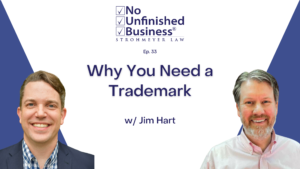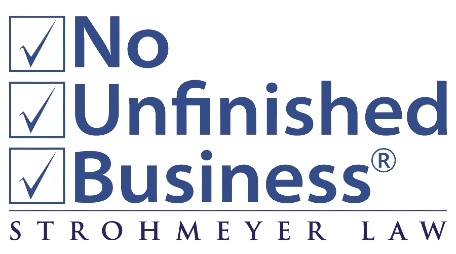How Do I Protect My Digital Assets in My Estate Plan?
Protecting Your Digital Assets
You’re probably familiar with most real (physical stuff, land) and intangible (IP, marks) property, and have them included in your estate plan. But many people forget about their DIGITAL assets – social accounts, photos, domains, and more.
These digital assets are increasingly a part of our lives, and increasingly valuable! John walks us through some general considerations for addressing digital assets in our estate plan:
– Inventory of digital assets
– Password records (hopefully using a password manager)
– Terms Of Service – know what your estate can even do with certain accounts, particularly with domains
– How do people access your digital assets?
– Finally, what should happen to each of these once you’re gone?
Video Transcript:
I’ve got all these digital assets. What do I do with them?
Now, we know about the two main types of property that people think about. There’s physical property, which is something you can pick up and hold, and there’s also real property, which is the dirt under your feet that you happen to own.
There’s also various types of intangible property. These are the sort of things that you can’t put your hands on, but you still consider your stuff. So, we’re going to put aside the tangible property, like the stuff on your desk, the bookshelf full of stuff behind you, and the pennant on the wall, wherever it is. All of this stuff can be personal property. You can also think about the house. That’s easy to deal with; file a deed. You can transfer it. The real issue is we have all of these digital assets now, and we need to know what we can do to transfer them onto the next generation if we want to.
What kind of stuff are we talking about?
These digital assets can come in various forms. What I’m not going to be talking about are things like your online accounts. Just because you can access your Chase account, your Wells Fargo account, or any other bank or brokerage account through an online portal, doesn’t mean it’s a digital asset. What we’re thinking about here are things like your Facebook account or your online photo albums. What about your Amazon account? Do you have any domains? You might want to be sure you know how to deal with those.
First and foremost, you’re going to be looking at the terms of service for these accounts. What happens when you pass? Can you pass anything along? You’re going to have to go through and figure out what happens. For example, Facebook will allow people to come in and take over those accounts, so that they can designate it as a deceased account. It then stays up as some sort of tribute page. Twitter a has similar process. But, it’s important to know what is going to happen and look at it before something happens to you. What you don’t want is to leave your family in a position where they can’t access these accounts.
Inventory & password records
So what can you do? First, you’re going to have access to these accounts through some sort of password and log-in combination, so you want to make sure that everybody knows where those are. The big problem with this is if your family doesn’t know what you own or where it is. They’re not going to have any chance of finding it or ever logging in. So, again, having some sort of password storage system is crucial for this. A lot of people say, “I’ll just keep it in my head”. The problem with this is that once your head is no longer accessible, we can’t get into those accounts and we certainly don’t know where they are.
Some people start keeping notes, whether electronic or on paper. This is a better system, but it’s not the best, because those passwords don’t stay current. You may have written something down then changed that password, which means what’s written down isn’t accessible anymore. You may not have also written down how to get into the computer where you’ve already automatically logged in.
What I really like is having some sort of outside password manager. Personally, I use Dashlane, but any of the major ones, if they’re a reputable company and you like using it, that’s more important. Why? It’s going to make sure that you’re using randomized passwords to store your passwords. That gives you an extra layer of protection, because without it, if somebody figures out that your password combination is some sequence of your birthday, your wedding date, your kids names, and your dog’s names, they can get into a lot of accounts. If you have randomly generated passwords from your password manager, it’s going to be an extra layer of protection to keep somebody from just randomly getting into one of your accounts and then getting into all of your accounts.
Who can access it? What is allowed?
The next thing to think about is if someone else can access that account on your behalf once you’re gone. What you will see in a lot of terms of service is that the only the person who is allowed to access that account is the owner of that account. If Google, Facebook, or Twitter finds out that somebody else is logging into your account, they can freeze the account. They might even shut it down. Now, if you’ve got an account, that’s worth something, such as if you’ve got lots of followers or an email account that is tied to it, you may not want to lose the value of that list of access to that audience. So, you need to make sure you’re complying with the terms of service and that somebody can get in and manage that on your behalf.
This can come up in the case of domains. Generally, people are going to be buying domains in their own name. I, for one, use Hover to go get my accounts or domain names, and previously I had been buying them in my own name.
I’ve since transferred this to an entity, my law firm, which now owns all our websites. Why? If I had been logging in under my own name, and somebody came in and logged in later, they couldn’t get into that account. There was nothing else that they could do. There was no amount of password cracking because the owner of the account wasn’t the entity.
There are stories out there of people who have bought domains that have a lot of value, but then nobody could get in and manage the re-up or the renewal of the domain registration. So, they had to wait until the domain registration expires and then somebody else got to come in and bid on that account. Versus, if they’d still had access to the account, they could come in and renew it on time for the normal fee that they’d have to pay.
In Summary
So, a lot of the things that we need to think about when it comes to digital property are the same things we think about when we are thinking about tangible property and real property. Yes, it is a different class of property because you can’t reach out and touch it, but you still want to have a good inventory of what it is and what you own. The next thing people need to know is how to access this property. It’s one thing to say that John has this Twitter account or that YouTube account, but once he passes, how do we get into it? Where are the passwords? How do we know where they are?
So, again, number one, inventory, number two, access ability, and finally, number three, what should happen to this property? There are a lot of services out there that will help you manage this, such as DCS (Directive Communication Services), and will effectively allow you to set beneficiary designations for your digital assets.
You can say that on your death, make sure that this person owns or has access to this account, and make sure that this person gets access to this Twitter account. If you happen to have an Ashley Madison account, close that account down, and don’t ever tell anybody it existed. This gets carried out and that’s part of what these services are doing for you.
Looking at all the things that can happen, you want to take stock, look at where you’re going, look at what should happen to those assets, and construct your plan with that in mind.
End-of-Year Strategies for Irrevocable Gifting Trusts
As the year draws to a close, there are some crucial actions to take with an irrevocable gifting trust.
What to Do If You Receive an IRS Letter
Receiving a letter from the IRS might send shivers down your spine. So what's your first step? Is it always a cause for alarm? Let's walk through what you should do.
Why You Need a Trademark
We'll explain the the four main areas of intellectual property for business owners, why trademarks are crucial, and how to get your marks registered.





